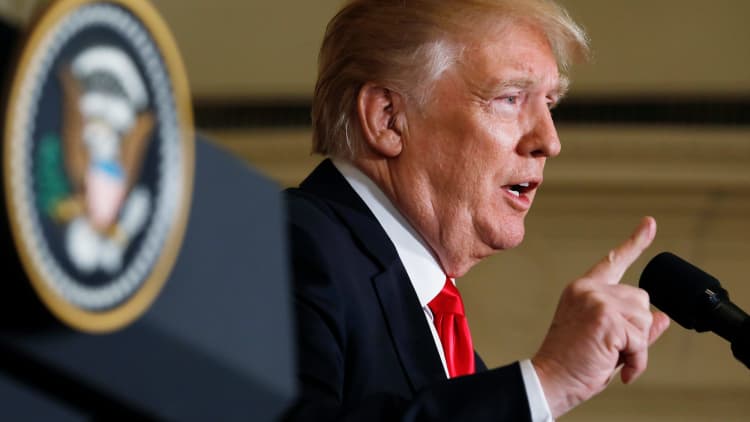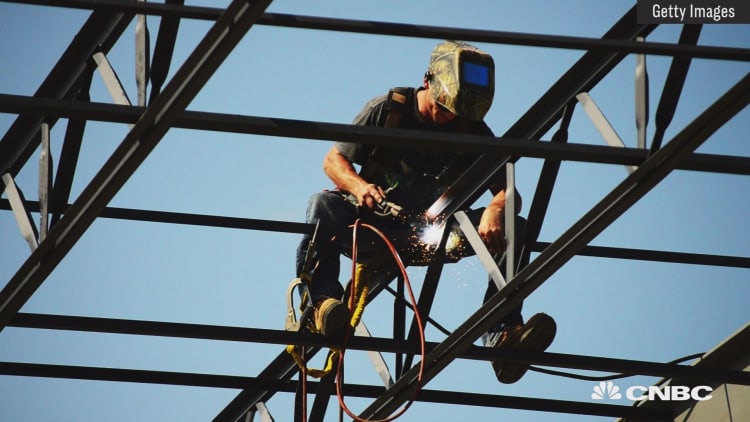
The White House is downplaying rumors of Gary Cohn's departure, after the chief economic advisor got overruled on President Donald Trump's decision to impose steep tariffs on steel and aluminum imports.
Asked Friday whether Cohn planned to stay in the job, White House press secretary Sarah Huckabee Sanders told reporters she had no reason to believe otherwise. Reports suggested Cohn, who opposes the tariffs, could now leave the administration after losing an internal tug-of-war over the policy.
For a while Thursday morning, it looked like Cohn and his anti-protectionist stance might have won out. The White House first delayed a tariff announcement, despite Trump's repeated pledges to scrap trade deals he says hurt American workers and hit back at countries for trade practices he deems unfair.
A decision not to impose tariffs would have capped an incredible turnaround for Cohn, who just last year was in Trump's doghouse for criticizing the president's divisive comments blaming people on "both sides" for violence at a white supremacist rally in Charlottesville, Virginia. The economic advisor also was a key player in steering Trump's only landmark legislative win, the sweeping tax cuts he signed into law in December.
Ultimately, Trump stuck by his trade promises Thursday despite Cohn's advice.
In considering whether to leave the White House, Cohn will have to decide whether he wants the administration to lose his globalist views that are a counterweight to Trump and those advisors who back protectionist policies. Cohn, a former Goldman Sachs executive, was considered a driving force behind Trump's speech at the Davos World Economic Forum, in which the president said "America First" does not mean "America alone."
How Trump's announcement played out
On Thursday morning, a White House official told CNBC the president would announce tariffs. The administration later backtracked, saying Trump would only hold a listening session with steel and aluminum executives, who support tariffs, without making an announcement.
The delay came as the free trade wing of the White House, led by Cohn, disagreed with trade hawks in the administration on whether to impose tariffs. Commerce Secretary Wilbur Ross, trade advisor Peter Navarro and U.S. Trade Representative Robert Lighthizer all backed the measures.
During the meeting with executives Thursday, Cohn argued against taking action, according to a person in the room. He warned about price increases for steel and aluminum products.
Trump let Cohn have the floor, then rebutted him, the person said.
"That's not the real world," the president said, adding the cost increases were a "small price to pay."
Ross also spoke during the meeting, but only when Trump addressed him. Among the other Trump advisors attending were Lighthizer, Navarro, chief of staff John Kelly, Treasury Secretary Steven Mnuchin, counsel Don McGahn, and senior advisors Jared Kushner and Stephen MIller.
During the White House meeting, Trump said he had made his decision, but the paperwork to enact it was not finished. "We're going to get those papers done, Don?" he asked McGahn.
Halfway through the event, Trump told the attendees he would impose tariffs of 25 percent on steel imports and 10 percent on aluminum imports, the person in the room said. The president left the event to attend a meeting on school safety for more than a half-hour.
When Trump returned, the White House assembled reporters to film the conclusion of the meeting. The president prompted executives to explain why they supported the tariffs.
When asked by reporters, Trump announced the 25 percent and 10 percent tariffs on the metals himself.
— CNBC's Eamon Javers contributed to this report.
WATCH: Trump's tariffs could lead to unintended consequences



